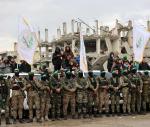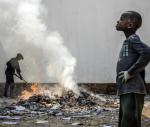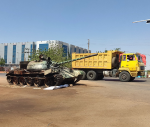You are here
For a polio-free world
Mar 30,2016 - Last updated at Mar 30,2016
In the last year, the attention of the world has been increasingly focused, and rightly so, on the plight of the estimated 6 million refugees of the Syrian civil war.
Many countries, Jordan in particular, opened their borders and their hearts to this population. Yet, as we turn our efforts to this immediate crisis, we must not neglect the need to prevent the crisis that could so easily follow it: a resurgence of vaccine-preventable diseases, such as polio.
A 2014 UNICEF report estimated that only 52 per cent of Syrian children were fully vaccinated against polio, down from a pre-war high of 99 per cent.
In 2013, 14 years after the last case of polio in Syria, 35 new cases were confirmed in that country, with an additional two cases identified in neighbouring Iraq; poliovirus was detected in sewage samples throughout the region, including in Jordan.
The reappearance of poliovirus in such a vulnerable population created a second crisis in the midst of the first.
To stop the outbreak from spreading across the region and the world, 27 million children, across eight countries and many areas of conflict, had to be vaccinated.
The government of Jordan responded quickly to the Syrian outbreak, conducting multiple polio immunisation rounds within its borders to protect its citizens from the paralysing disease.
In this, Jordan worked in close coordination with the Global Polio Eradication Initiative (GPEI), a partnership including Rotary International, the World Health Organisation, UNICEF, and the United States Centres for Disease Control and Prevention.
As a result of Jordan’s diligence, the country has not reported a single case of polio within its borders — among its citizens or its refugee population.
The outbreak in Syria has since been stopped, with the country now passing more than two years without a case of the disease.
When the GPEI was formed in 1988, 350,000 children were paralysed or killed by polio every year, even though a vaccine existed that was safe, effective and easy to administer, with the potential to wipe the virus out completely.
In response to that untenable situation, the GPEI took on the task of polio eradication; soon after, the World Health Assembly, representing every country of the UN at that time, unanimously voted to commit to the complete eradication of polio.
Today, as a result of globally coordinated efforts costing well over $10 billion, polio cases have been reduced by 99.9 per cent; only 74 cases were confirmed in 2015.
Over 15 million cases of paralysis, and some 1.5 million deaths, have been prevented by the global commitment to eradicate polio. The human suffering that has been averted is staggering; the progress that has been made is unprecedented.
Today, the world stands on the brink of eradicating polio.
Pakistan and Afghanistan are the only countries harbouring a reservoir of poliovirus that has never been eradicated. Yet these areas, far from the vulnerable children of Syria, are the source of many of the fighters who now flow into the Middle East. Their travels have created a path for the virus, from the last endemic areas to the children most at risk.
The only way to fully protect these children — and all children — is to eradicate the virus.
However, we still face a funding gap of $1.5 billion to complete this task, along with the ongoing risk of polio outbreaks in polio-free countries, particularly those impacted by conflict.
We in Rotary urge Jordan to maintain its diligence against the threat of polio by ensuring that every single child receives the polio vaccine.
And we call on all governments, across the region and throughout the world, to finish the work that they committed to 28 years ago: to keep the promise that we made to our children, of a polio-free world.
The writer is president of Rotary International. He contributed this article to The Jordan Times.













